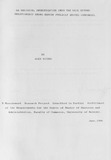| dc.description.abstract | The relationship between risk and return is of immense interest
not only to scholars but to ordinary people too. It is for
this reason that this subject has received rigorous research attention
from a diverse spectrum of researchers. In Kenya very
little has been done to ascertain the nature of this relationship.
This research gap was the main driving force behind this
research.
Usi~g market data from forty-five publicly quoted companies,
this research sought to determine the relationships between systematic
risk and returns and unsystematic risk and returns. Data
collected in the form of quarterly stock prices and dividends was
transformed into quarterly returns. Risk parameters were then
computed using returns for the period 1979 to 1987 by use of the
simple linear regression model. Return parameters were computed
for the period 1984 to 1988. A replication procedure was utilized
so as to produce five sets of risk coefficients and fifteen sets
of return param~~ers. Correlation. analysis was finally carried
out using Spea~fuan~~ nOAParametric!test statistic so as to determine
the nature of the relationship.
tive
The results of this study indicate that there exists a posi-
(albeit statistically insignificant) relationship between
systematic risk and returns. These results tend to support
finance theory which states that investors are rewarded via high
returns for taking on high risks. The relationship between unsystematic
risk and returns is negative and also statistically insignificant
which again is in conformity with finance theory.
Despite the short time period chosen for the study, it is apparent
that the concept of risk-return tradeoff holds for companies
quoted on the Nairobi Stock Exchange. However, the lack of
strong correlations between systematic risk and returns indicate
that there is either under or over-compensation for taking on
high risks. This is hardly surprising, given that the Stock Exchange
is not perfect. More important however, the results of
this study underscore the need for risk analysis by investors,
rather than taking high risks blindly with the hope of getting
high returns.
.; | en |

